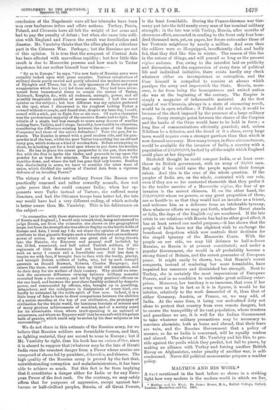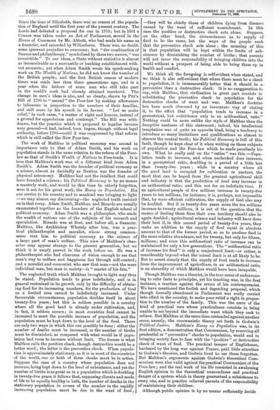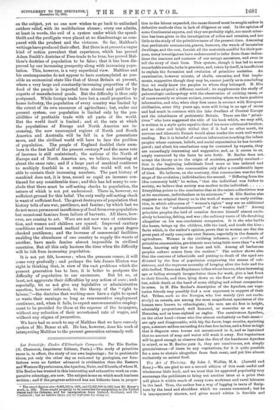MALTHUS AND HIS WORK.*
A FACT mentioned in the book before us shows in a striking light how very modern is the modern world in which we live.
* Malthus and his Work. By James sonar, *at., B01101 College, Oztord. London : Macmillan and Co. 1885. Since the time of Elizabeth, there was no census of the popula- tion of England until the first year of the present century. The Lords had defeated a proposal for one in 1753; but in 1801 a Census was taken under an Act of Parliament, moved in the House of Commons by Mr. Abbott, who had made his name as a financier, and seconded by Wilberforce. There was, no doubt, some ignorant prejudice to overcome ; but "the combination of finance and philanthropy," symbolised by these two names, " was irresistible." To our ideas, a State without statistics is almost as inconceivable as a mercantile or banking establishment with- out accounts ; yet when Adam Smith wrote his epoch-making work on The Wealth of Nations, he did not know the number of the British people ; and the first British manses of modern times was made less than three generations ago, and in a year when the fathers of some men who still take part in the world's work had already attained manhood. The change in men's ideas is also, and as clearly, shown by Pitt's Bill of 1796 to " amend" the Poor-law by making allowances to labourers in proportion to the numbers of their families, and still more by his speech in its favour. " Let us make relief," in such cases, "a matter of right and honour, instead of a ground for opprobrium and contempt." The Bill was with- drawn, but the practice which it proposed to legalise became very general—it had, indeed, been begun, though without legal authority, before 1796—until it was suppressed by that reform which is still called the New Poor-law.
The work of Malthus in political economy was second in importance only to that of Adam Smith, and his work on population stands in the same relation to the reform of the Poor- law as that of Smith's Wealth of Nations to Free-trade. It is true that Malthus's work was of a different kind from Adam Smith's. Adam Smith was the founder of political economy as a science, almost as decidedly as Newton was the founder of physical astronomy. Malthus had not the intellect that could have founded a science ; his Political Economy is by no means a masterly work, and would by this time be utterly forgotten, were it not for his great work, the Essay on Population. His one service to his country and to mankind was bringing to light —we may almost say discovering—the neglected truth insisted on in that essay. Adam Smith, Malthus, and Ricardo are usually enumerated together as the founders of the English school of political economy. Adam Smith was a philosopher, who made the wealth of nations one of the subjects of his research and speculation. Ricardo was at first, and before all, a financier. Malthus, like Archbishop Whately after him, was a prac- tical philanthropist and moralist, whose strong common- sense sent him to political economy as the science of a largo part of man's welfare. This view of Malthus's char- acter may appear strange to the present generation, but we think it is amply proved in the work before us. He was a philanthropist who had clearness of vision enough to see that man's way to welfare and happiness lies through self-control ; and a moralist and economist who saw that man—not the mere individual man, but man in society—is " master of his fate."
The neglected truth which Malthus brought to light may thus be stated. Population tends to grow indefinitely, and is in general restrained in its growth only by the difficulty of obtain- ing food for its increasing numbers, for the production of food on a limited area cannot be indefinitely increased. Under favourable circumstances, population doubles itself in about twenty-five years ; but this is seldom possible in a country where all the good land is already under cultivation, and, in fact, it seldom occurs ; in most countries food cannot be increased to meet the possible increase of population, and the population must be kept down to the level of the food. There are only two ways in which this can possibly be done ; either the number of deaths must be increased, or the number of births must be diminished, as compared with what would be if popu- lation had room to increase without limit. The former is what Malthus calls the positive check, though destructive would be a better word ; the latter is the preventive check. When popula- tion is approximately stationary, as it is in most of the countries of the world, one or both of these checks must be in action.
Suppose the case of a country where population does not increase, being kept down to the level of subsistence, and yet the number of births is as great as in a population which is doubling in twenty-five years, it follows that, supposing climate and mode of life to be equally healthy in both, the number of deaths in the stationary population in excess of the number in the rapidly increasing population must be due to the want of food ; —they will be chiefly those of children dying from diseases caused by the want of sufficient nourishment. In this case the positive or destructive check acts alone. Suppose, on the other hand, the circumstances as to supply of food to be the same, but the ways of the people such that the preventive check acts alone ; the meaning of this is that population will be kept within the limits of sub- sistence by diminishing the number of births ; that parents will not incur the responsibility of bringing children into the world without a prospect of being able to bring them up in health and comfort.
We think all the foregoing is self-evident when stated, and we think it also self-evident that where there must be a check to population, it is immeasurably better that it should be a • preventive than a destructive check. It is no exaggeration to say, with Malthus, that civilisation in great part consists in substituting the preventive check to population for the destructive checks of want and war. Malthus's doctrine has been much obscured by an inaccurate way of stating it, to the effect that "population tends to increase in a geometrical, but subsistence only in an arithmetical, ratio." Nothing could be more unlike the style of Malthus than the deceptive neatness of this statement; indeed, his intellectual temptation was of quite an opposite kind, being a tendency to introduce so many limitations and qualifications as almost to obscure the central truth ; his Political Economy is full of this fault, though he kept clear of it when writing on those subjects of population and the Poor-law which he made peculiarly his own. What he really said on the " ratios " was this :—Popu- lation tends to increase, and when unchecked does increase, in a geometrical ratio, doubling in a period of a little less than twenty-five years ; while in a country where all the good land is occupied for cultivation or pasture, the most that can be hoped from the greatest agricultural skill and industry is that the production of food may increase in an arithmetical ratio ; and this not for an indefinite time. If an agricultural people of five millions increase in twenty-five years to ten millions, for instance, it is, perhaps, not impossible that, by more efficient cultivation, the supply of food also may be doubled. But if in twenty-five years more the ten millions increase to twenty millions, it is out of the question that the means of feeding them from their own territory should also be again doubled ; agricultural science and industry will have done their best if, in this second period of twenty-five years, they make an addition to the supply of food equal in absolute amount to that of the former period, so as to produce food in the same relative abundance, not for twenty, but only for fifteen, millions ; and even this arithmetical ratio of increase can be maintained for only a few generations. The "arithmetical ratio of increase for food" is only a conjectured limit—or rather, is considerably beyond what the actual limit is at all likely to be. But to assert simply that_ the supply of food tends to increase from the improvement of agriculture, in an arithmetical ratio, is an absurdity of which Malthus would have been incapable.
Though Malthus was a theorist, in the true sense of endeavour- ing to refer facts to principles, yet his teaching was, in the first instance, a reaction against the errors of his contemporaries. We have mentioned the foolish and degrading proposal, which though formally abandoned in Parliament was really carried into effect in the country, to make poor-relief a right in propor- tion to the number of the family. This was the error of the kind of practical men whose practicalness consists in being unable to see beyond the immediate want which they seek to relieve. But Malthus at the same time contended against another error, namely, the communistic theory set forth in Godwin's Political Justice. Malthus's Essay on Population was, in its first edition, a demonstration that Communism, by removing all prudential or "preventive" checks to population, would end in bringing society face to face with the " positive " or destructive check of want of food. The practical temper of Englishmen, hardened by the long war against France, paid little attention to Godwin's theories, and Godwin lived to see them forgotten. But Malthus's arguments against Godwin's theoretical Com- munism were also valid against the practical Communism of the Poor-law ; and the real work of his life consisted in awakening English opinion to the theoretical unsoundness and practical danger of a system which in theory guaranteed a subsistence to every one, and in practice relieved parents of the responsibility of maintaining their children.
Although public opinion is by no means sufficiently decide on the subject, yet no one now wishes to go back to unlimited outdoor relief, with its multifarious abuses ; every one admits, at least in words, the evil of a system under which the spend- thrift and the profligate were placed at no disadvantage as com- pared with the prudent and the virtuous. So far, Malthus's writings have produced their effect. But there is at present a vague kind of notion prevalent that experience, which has proved Adam Smith's doctrine of Free-trade to be true, has proved Mal- thus's doctrine of population to be false ; that it has been dis- proved by our increasing prosperity along with increasing popu- lation. This, however, is a very superficial view. Malthus and his contemporaries do not appear to have contemplated as pos- sible an economical state like that of (ireat Britain at present, where a very large and constantly-increasing proportion of the food of the people is imported from abroad and paid for by exports of manufactured goods. But the difficulty is thus only postponed. While foreign trade bore but a small proportion to home industry, the population of every country was limited by the extent of its own resources of agriculture ; but, under our present system, our population is limited only by the pos- sibilities of profitable trade with all parts of the world. But the world itself is limited ; and at the rate at which the populations of Europe and North America are in- creasing, the now unoccupied regions of North and South America and Australia will be full in a few generations more, and the civilised world will have to face the problem of population. The people of England doubled their num- bers in the first half of the present century,* and the same rate of increase is still maintained ; the nations of the North of Europe and of North America are, we believe, increasing at about the same rate; and if a large part of mankind continues to multiply fourfold in a century, the world will not be able to contain their increasing numbers. The past history of mankind does not, it is true, record so rapid an increase con- tinued for any considerable time ; and this has led many to con- clude that there must be self-acting checks to population, the nature of which is not yet understood. There is, however, no sufficient ground for this belief. The only really self-acting check is want of sufficient food. The great destroyers of population that history tells of are war, pestilence, and famine ; by which last we do not mean permanent insufficiency of food from over-population, but occasional famines from failure of harvests. All these, how- ever, are ceasing to act. Wars are not now wars of extermina- tion, and women and children are spared. Improved sanitary conditions and increased medical skill have in a great degree checked pestilence ; and the increase of commercial facilities, enabling the abundance of one country to supply the wants of another, have made famine almost impossible in civilised countries. But all this only hastens the time when the difficulty will be felt from increasing population.
It is not yet felt, however ; when the pressure comes, it will come very gradually ; and perhaps the late James Hinton was right in thinking that, in view of the vast problems which the present generation has to face, it is better to postpone the difficulty of population to our successors. But let us, at least, not aggravate their difficulties by any action of ours ; and, especially, let us not give any legislative or administrative sanction, however informal, to the theory of the " right to labour,"—the doctrine that working-men have a right to spend or waste their earnings so long as remunerative employment continues, and, when it fails, to expect unremunerative employ- ment to be provided for them at the expense of the taxpayers, without any reduction of their accustomed rate of wages, and without any stigma of pauperism.
We have had so much to say of Malthus that we have scarcely spoken of Mr. Bonar at all. He has, however, done his work of interpreting Malthus to the present generation extremely well.




















































 Previous page
Previous page